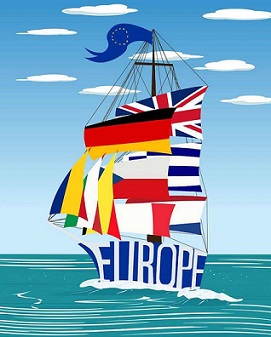
Regulations have huge effects on your life. Tougher car safety standards, for example, may save your life but they also make your car more expensive to buy and operate. Obscure food regulations could cost you hundreds, maybe thousands a year. In many cases these regulations aren’t even set by our federal or state government but are instead, forced upon us by obscure groups and technical commissions you’ve never heard of.
No one is more influential in the making of these rules than the European Union which has more global clout than most realize. According to Colombia Law Professor Ana Bradford in her book The Brussels Effect – How the European Union Rules the World, EU laws determine not only the default privacy settings on iPhones, but the type of speech that Twitter deletes as unacceptable. EU laws also determine how timber is harvested in Indonesia, how honey is produced in Brazil, what pesticides cocoa farmers use in Cameroon, what equipment is installed in dairy factories in China, what chemicals are incorporated in plastic toys in Japan as well as how much privacy is afforded to Internet users in Latin America.
How do they get away with it? Businesses want to sell their products to the widest consumer base possible and it’s not cost effective to apply EU rules only to products sold overseas. Instead, manufacturers apply the EU regulations to everything they sell. Once big businesses commit to applying EU regulations, they become, in effect, agents of the EU and are motivated to pressure national governments around the world to adopt the EU’s rules which helps them squash their smaller competition.
Not those EU bureaucrats need the help. They are quite aggressive in forcing EU rules on other countries. The EU signs a lot of trade deals using its vast market size as a bargaining chip that allows them to demand significant changes for other countries rules and regulations. Then they provide technical expertise to draft local variants to introduce EU rules into the economy.
The European Court of Justice (ECJ) also applies EU rules to other countries. In 2012, it famously ruled that Google, an American company, had to respect the right of a Spanish citizen to be “forgotten” and to delete certain data from search results on her name.
So why should you care? Well, some of these rules restrict your individual freedom of speech. Try to send the “wrong” type of video to your friend, and you may quickly become familiar with the new censors of the Internet. YouTube, Facebook and other social media platforms have been downplaying, hiding and deleting content that their leadership disapproves of. That’s old news. But now the censorship is becoming more aggressive.
Instead of being guided by America’s First Amendment, Facebook, Twitter and YouTube follow the EU’s definition of hate speech when deciding which content to remove. Google once had a more open directive but now they are choosing to switch to a more restrictive European style of hate speech regulations.
YouTube has spent the coronavirus period playing whack-a-mole, smacking down videos that present any kind of dissenting view. Try sharing dissenting videos with a friend on WhatsApp, which is owned by Facebook and you’ll find yourself blocked. WhatsApp can not only detect what you are doing, even in “private” messaging, but they can limit how much you share of content they disapprove of.
Search for information about coronavirus on Google, and you’re taken to a special part of the site that links only to mainstream sources promoting the same mainstream narrative. Encourage people to protest lockdown orders on Twitter, and you’ll see your account suspended.
You think it’s frustrating now, just wait! Last year, the European Court of Justice ruled that a judge in an EU country can order content to be taken off of social media worldwide. Social Media “must adopt” an approach of self-limitation. And there is no safeguard.
This summer has shown these American tech companies are not reluctant to censor. Even if the EU did nothing, a lot of this censorship would still be going on. Big Tech overwhelmingly supports Democrats. But it still matters that the EU writes the rules. It has drawn up the borders of acceptable speech, and European judges patrol them. They’re already pushing Facebook and Google toward more censorship than the tech giants would have otherwise implemented.
The Worldwide Web is changing before your eyes. It was once a free-for-all, with all the good and bad that came with it. Now the vast majority of traffic is funneled through a handful of gatekeepers, which will only allow you to see certain things. And it is the German-led European Union that is determining what you can and cannot see.
Source: How Much Does the EU Rule YOUR Life? By Richard Palmer, The Trumpet

